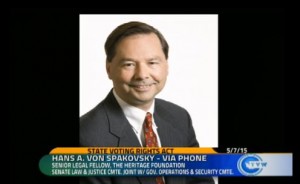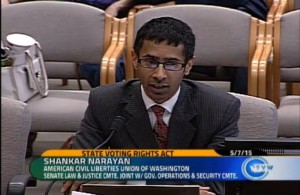Today Sen. Mike Padden, chairman of the Senate Law and Justice Committee, held a joint work session with the Senate Government Operations and Security Committee to examine concerns that a proposed state version of the Voting Rights Act could increase litigation and costs for local jurisdictions.
“The proposed Washington State Voting Rights Act attempts to address a legitimate concern about the need for fair representation for all Washingtonians in our electoral process,” said Padden, R-Spokane Valley. “But there are those who have equally legitimate concerns about the potential for frivolous lawsuits such a law could encourage, and whether a state version of the law is even needed.”
House Bill 1745 would create a legal cause of action – meaning a basis for filing a lawsuit – when local and district elections exhibit “polarized voting between voters in a protected class and other voters, and where members of the protected class do not have an equal opportunity to elect their preferred candidate or influence the election.” Under the bill, a protected class is a group of voters who are members of a particular race, color or language minority group.
If passed, the act would apply to certain elections held within counties, cities, towns, school districts, fire protection districts, port districts and public utility districts.
 Testifying by phone, Hans von Spakovsky, manager of the Election Law Reform Initiative and Senior Legal Fellow at the Washington, D.C.-based Heritage Foundation, argued that the state version of the VRA is fraught with vague and poorly-written language that will increase litigation.
Testifying by phone, Hans von Spakovsky, manager of the Election Law Reform Initiative and Senior Legal Fellow at the Washington, D.C.-based Heritage Foundation, argued that the state version of the VRA is fraught with vague and poorly-written language that will increase litigation.
“One provision of the proposed state law would make even a small difference in the preference of a minority group and the rest of the electorate a violation of the law, which is bound to lead to excessive litigation,” said von Spakovsky. “The bill also discusses an opportunity to ‘influence’ an election, a vague term that would also lead to more litigation.”
Von Spakovsky argued that the bill, if adopted, would result in the greater use of legal action to achieve political ends. “The law should prohibit discriminatory conduct, not try to guarantee specific political results,” he said.
 Shankar Narayan with the Washington chapter of the American Civil Liberties Union told committee members that the bill was crafted to specifically encourage more dialogue and preparation in hopes of avoiding lawsuits before they begin.
Shankar Narayan with the Washington chapter of the American Civil Liberties Union told committee members that the bill was crafted to specifically encourage more dialogue and preparation in hopes of avoiding lawsuits before they begin.
“In crafting this bill, we attempted to provide strong incentives for the parties to avoid litigation,” said Narayan. “This bill is a mechanism to avoid litigation before it ever happens. The bill makes it very clear that there must be a remedy, prior to a case moving forward. This weeds out frivolous complaints and lower costs.
“If a jurisdiction does make good-faith changes to its system, it is given a safe harbor from litigation for four years. This is a really powerful incentive that doesn’t exist in any other [federal or state voting rights] law.”
Professor Justin Levitt from Loyola Law School in Los Angeles agreed, testifying that the Washington bill appears to be written in such a way as to address many of the litigation concerns in other state VRAs passed in California, Illinois and Florida.
John Safarli, an attorney with the firm representing the city of Yakima in the current federal VRA lawsuit, strongly disagreed, telling the lawmakers that the Washington measure would unnecessarily duplicate the federal process, increase cost for local jurisdictions and, if the experience in California is any indication, attract trial lawyers eager to pursue litigation. He discussed the mechanics of the proposed state law, and how it would impact cities and school districts.
“Under the Washington VRA, the plaintiff does not need to show that members of the protected class are geographically compact or concentrated enough to constitute a majority in a proposed single-member district – an important evidentiary threshold and gate-keeping function under federal law,” Safarli said.
Although the bill allows local governments to voluntarily change their election systems, Safarli said that benefit is “outweighed by the harms that would arise from creating an unnecessary and costly new cause of legal action.”
“The Washington VRA is unnecessary,” said Safarli. “Section 2 of the Federal VRA serves the same function and there is nothing inherently less expensive about state litigation.
“If the proponents want to allow local governments to change their election system, then why not pass a simple bill that gives them that authority? What is the purpose of including a new cause of action when one already exists under federal law?”










